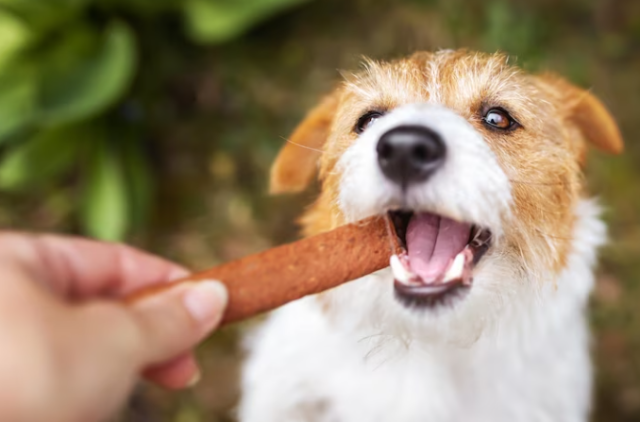Introduction
Dog dental health is an often-overlooked area that can have a significant impact on a pet’s overall health. Poor dental hygiene can lead to bad breath, gum disease, and even tooth loss. This is where dog dental chews come in as a potential solution. But do dog dental chews work? In this article, we will explore the scientific evidence supporting the use of dog dental chews and discuss how to choose high-quality products that may help maintain good oral hygiene in dogs.

What Are Dog Dental Chews?
Before we explore whether dog dental chews work or not, it’s important to understand what they are and how they work. Dog dental chews are designed to help clean your pet’s teeth while also providing them with a tasty treat. Some popular types include rawhide chews, bones, and other chew toys made from materials like rubber or nylon.
One way that these chews work is by removing plaque buildup from your pet’s teeth as they chew on them. This mechanical action helps scrape away bacteria and food particles that can lead to tooth decay or gum disease. Additionally, some dog dental chews contain special ingredients such as enzymes or antimicrobial agents that may help kill harmful bacteria in your pet’s mouth.
Do Dog Dental Chews Work?
Now let’s get to the question at hand – do dog dental chews actually work? The answer is yes; although the efficacy may depend on various factors such as the type of chew used and how often it is given to your pet.
Studies have shown that certain types of dog dental chews can significantly reduce plaque buildup in dogs’ mouths. One study published in the Journal of Veterinary Dentistry found that when dogs were given daily access to rawhide bone treats for four weeks, there was a 70% reduction in plaque accumulation compared to dogs who did not receive the chews. Another study, published in the Journal of Periodontology, found that chew toys made from a specific type of nylon significantly reduced plaque and tartar buildup in dogs‘ mouths.
It’s worth noting that some critics argue that dog dental chews only provide a superficial cleaning and may not be effective for older dogs with significant dental issues. However, many veterinarians still recommend them as part of a comprehensive oral hygiene routine.

How to Choose a Good Dental Chew
If you’re considering using dog dental chews to help maintain your pet’s oral health, it’s essential to select high-quality products. Here are some tips for choosing an appropriate chew:
Look for the VOHC Seal
The Veterinary Oral Health Council (VOHC) is an organization that evaluates pet products for their effectiveness in maintaining good oral hygiene. The VOHC seal indicates that a product has been tested and found to be effective at reducing plaque or tartar buildup.
Select the Right Size and Texture
Choose a chew toy that is appropriately sized for your pet based on their age, breed, and chewing habits. Make sure it’s not too small (as this can be a choking hazard) or too hard (which can damage teeth). Also, consider the texture – softer chews may be more suitable for puppies or older dogs with sensitive teeth.
Alternatives to Dog Dental Chews
While dog dental chews can be helpful in maintaining your pet’s oral health, they are not the only solution available. Here are some other methods you can use in conjunction with dog dental chews or instead of them:
Regular Teeth Brushing
Just like humans, dogs benefit from regular teeth brushing to remove plaque and prevent gum disease. Use toothpaste specially formulated for pets and choose a soft-bristled brush.
Professional Cleaning
Regular visits to the veterinarian for professional cleaning can help remove stubborn plaque buildup and keep your pet’s teeth healthy.
Specific Dietary Considerations
Certain types of food can promote good dental hygiene in dogs. Look for kibble that is designed to scrape away plaque or consider feeding your pet raw bones (although be careful not to give them cooked bones, which can splinter and cause harm).

The Bottom Line
So, do dog dental chews work? The scientific evidence suggests that they can be effective in maintaining good oral hygiene in dogs. However, it’s essential to select high-quality products and use them in conjunction with other oral hygiene practices like regular brushing and professional cleaning. By taking a proactive approach to your pet’s dental health, you can help ensure they lead a happy and healthy life.
FAQs
Q1: How often should I give my dog a dental chew?
It is recommended to give your dog a dental chew at least once a day.
Q2: Are there any risks associated with using them too frequently?
Using dental chews too frequently can lead to stomach upset and diarrhea in some dogs. Monitor your dog's reaction and adjust accordingly.
Q3: What if my dog doesn't show interest in chewing?
Try different types of dental chews or consult with your veterinarian for alternative teeth cleaning options.
Q4: Can I use human toothpaste to brush my dog's teeth?
No, human toothpaste contains ingredients that are harmful to dogs if swallowed. Use toothpaste specifically designed for dogs.
Q5: At what age can I start giving my puppy dental chews?
Consult with your veterinarian, but typically puppies can start chewing on soft dental chews around 12 weeks old.
Read also
- 7 Secrets About Chihuahua Husky Mixes That Will Amaze You!
- Cheap Dog Toys: Affordable and Fun Toys for Your Furry Friend
- Why Is My Dog Barking at Nothing?: Unraveling the Mystery
- Unleash the Best Dog Food for Chihuahuas | A Guide for Optimal Nutrition
- Stop Your Dog’s Raw Skin Issues with Effective Chewing Treatment
- Discover the Enchanting Teddy Bear Dog Breed: A Perfect Companion for All Ages
- Unveiling the Enchanting Lady and the Tramp Dog Breed: A Tale of Elegance and Playfulness
- A Convenient Solution for Dog Food Storage Container 50 lbs of Kibble
- Top 10 Best Dog Raincoats | Keep Your Furry Friend Dry in Style
- Best Dog Food for Older Dogs: Nourishing Your Senior Canine Companion
- Choose the Best Dog Food for Your Picky Eaters Needs
- The Shiba Inu Pitbull Mix: A Fascinating Crossbreed
- Corgi vs Shiba Inu – Which Breed Is Right for You?
- Stop Dog Nail Bleeding Fast: 5 Easy Home Remedies
- Best Way to Give a Dog a Pill: A Guide to Making Medication Time Easier
- Dog Allergies: Understanding the Causes and Solutions
- Find the Best Dog Food for Your Huskies
- 7 Basic Dog Commands: A Guide to Training Your Pup
- Discover the Versatile Mountain Cur Dog Breed | All You Need to Know
- Understanding the Phrase “My Dogs Are Barking” and Its Meaning






